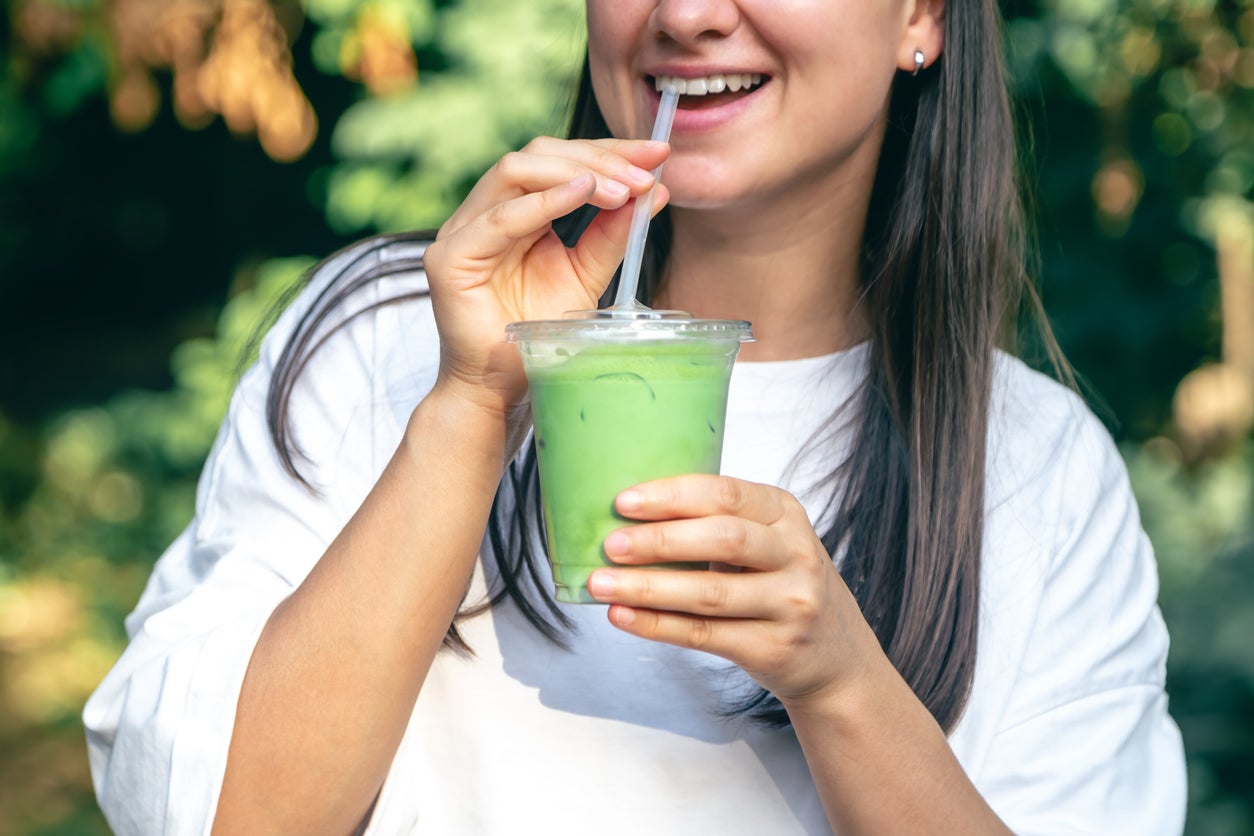How matcha lattes became a wellness status symbol
Health benefits plus lifestyle influencers have made the powdered green tea beverage a fashionable but costly obsession – Lydia Spencer-Elliott weighs up the costs and benefits


Your support helps us to tell the story
From reproductive rights to climate change to Big Tech, The Independent is on the ground when the story is developing. Whether it's investigating the financials of Elon Musk's pro-Trump PAC or producing our latest documentary, 'The A Word', which shines a light on the American women fighting for reproductive rights, we know how important it is to parse out the facts from the messaging.
At such a critical moment in US history, we need reporters on the ground. Your donation allows us to keep sending journalists to speak to both sides of the story.
The Independent is trusted by Americans across the entire political spectrum. And unlike many other quality news outlets, we choose not to lock Americans out of our reporting and analysis with paywalls. We believe quality journalism should be available to everyone, paid for by those who can afford it.
Your support makes all the difference.Zennah Chaudri, a personal trainer who lives in Covent Garden, starts every Sunday morning the same. She pulls on her lululemon gym kit, walks to pilates and picks up a matcha latte – the pastel green drink that currently has much of the UK obsessed – en route. “I just feel super boujee,” she says. “It’s my ritual. Love it.”
Head to Chelsea’s affluent King’s Road on a weekend morning and you can barely move for teens snaking out of the west London Blank Street Coffee branch. Its blueberry matcha recipe and “meet for matcha” slogan have helped popularise the beverage made from the powdered leaves of the green tea plant, Japanese Camellia sinensis, for around £4 a pop. Chaudri claims she spends £50 per month. My own bank statement reveals an embarrassing £65 per month habit. And if you earn the average salary for someone under 30 in the UK, around £30k, that’s a sizeable chunk of your wages. It’s no wonder Chaudri reached for the word “boujee” – from bourgeois, of course– to describe the lifestyle choice.
Matcha tastes like grass. But much like how the bitterness of coffee goes from wince-worthy to mouthwatering the more you drink it, the earthiness of matcha soon becomes its most addictive quality. What was once a niche health food is now on menus at chains like Leon. “I spend around £30 a week,” says luxury watch specialist Marie Dazzoni. “I just think it tastes really good. It’s great because it’s available almost everywhere. I go to Starbucks at least four times a week.”
The fact that it’s seen as “healthy” is key. As with reformer pilates and magnesium supplements, where wellness goes – the wealthy have followed. Cute colour and celebrity influence aside, many drinkers cite a bid to cut their coffee intake as the cause for their pricey habit. “Matcha is really high in antioxidants. Plus, the caffeine is much more slow releasing,” says nutritionist Jenna Hope. “So, rather than have that spike and crash you get with coffee, you get a gradual rise and a slow come down. None of that anxiety, heart racing, feeling that coffee has. It’s one of the key reasons people are making that switch.”
Japan Centre, owner of Europe’s largest Japanese food hall, says sales of their own-brand matcha powder you can brew at home have increased by over 40 per cent in the last 12 months. The market has a global value of $2.3bn (£1.8bn), which is predicted to rise to $2.9bn in 2028. On TikTok, over 964,000 aesthetic videos of the substance being whisked and poured sit under the matcha hashtag – with most videos made by designer-wearing influencers. Gwyneth Paltrow drinks it. So too, Kylie Jenner, Rihanna and Brad Pitt.
Not all matcha is created equal. The powder comes in different grades starting at culinary and rising to premium and ceremonial. As the quality increases, so too does the cost. “Matcha has a very specific way of being processed,” says Japan Centre executive Amelia Trillo, who cites the powder’s importation as a reason for its price point. “If it’s made outside of Japan, it won’t reach high quality,” she says. “The tea plant is grown in the shade. The leaves are picked by hand. You can only use the freshest leaves. Only 20 or 30 per cent of the plant is actually used. Then, it’s ground using a stone to make the powder.” Essentially, this is green gold dust.
Unlike coffee, there’s no genuinely cheap way to drink matcha lattes on a regular basis. At home pouches of the drinkable grade powder cost £16 for 30g in Holland and Barrett, £24 for 100g on Ocado and £30 for 60g in Harrods. Wherever you go, high street or high end, it’s many times the cost of an at-home Americano.
“Good quality green tea will also have similar benefits to matcha,” says Hope. “But it doesn’t have the same aesthetic that matcha has. You know, from a social media perspective.”
Seemingly half the appeal of matcha to those who’ve championed its popularity is to simply be seen drinking it. A cursory scroll of TikTok’s thousands of matcha videos reveals Belgravia’s high-end Cafe Kitsuné, where as many Chanel handbags are on the tables as matcha lattes. “Going to Kitsuné is like going to a fashion show,” one post reads. “A Kitsuné run is always my favourite,” another visitor adds as she hops in her white Porsche Cayenne.
Matcha is far from the first wellness drink to become an influencer accessory. Back in 2023, Hailey Bieber caused shockwaves across the internet with the release of her “skin glaze” smoothie at the luxury grocery store Erewhon. One cup – of almond milk, strawberries, vanilla collagen, hyaluronic acid, coconut cream, sea moss, avocado, maple syrup and dates – costs $20 (£15). Still, there were hour-long queues of customers waiting to try it.
@haileybieber my @Erewhon Market smoothie is now available as soft serve…🍦🍓 @Cosmic Bliss
♬ Yummy - Mixed - Justin Bieber
Despite the goal of drinking ourselves healthy, banana bread and peanut butter jelly matcha lattes both exist. So, it’s safe to say the powder’s health benefits have been decidedly messed with as its global consumption has increased. “People think that matcha is healthy but when you’re consuming it in that capacity it’s just really not,” warns Hope. “These matcha Frappuccino type drinks are problematic. They’re really high in sugar. Sometimes, they’ve had creams added to them. People are getting fooled into thinking this is a healthier option when it’s not.”
Routine-wise, matcha should provide a peaceful pause for the purists not a social media post for the posers, says Trillo. “In Japan, they’re not drinking lattes every day. It’s not a common thing,” she explains. “Matcha has been drunk for over 800 years but it’s traditionally enjoyed at tea ceremonies. It’s very specific. How to handle the bowl. How to sit. So, when someone wakes up and makes matcha in their own house in the UK, you should still use a matcha whisk that has to be put in warm water to open it up. You whisk the matcha in a certain motion. It’s like a ritual. A whole art form. Therapeutic.”
Whipped cream and your name being screamed by an overworked barista is a far cry from the serenity of a Japanese tea ceremony. Plus, for all the delicious – but syrup-pumped – servings of matcha on offer in the UK, you’ll experience just as many lukewarm, unwhisked, takeaway offerings that are nothing more than clumps of green grit floating in a plastic glass of milk. Having matcha out is often just a financial slap in the face disguised as a self-care decision.
Matcha is in its boom, but soon, like pumpkin spice and vanilla cold brew before it, its ready availability may become unchic. “I think the trend will continue for a few years,” says Trillo. “But I have a feeling, in the future, we’ll turn to other teas with a list of health benefits. Black sesame and Hojicha – roasted green tea – are slowly becoming popular in the form of lattes.”
So, wherever you go and whatever you do, there’ll more than likely be a £5 frothy beverage that hypnotises you into squandering your life savings. Because matcha or otherwise, we’re not addicted to lattes (although millennials spend £728 on them a year). We’re addicted to the dopamine hit of purchasing a sweet treat to sip on and carrying our silly little branded cups around the park.
Join our commenting forum
Join thought-provoking conversations, follow other Independent readers and see their replies
Comments